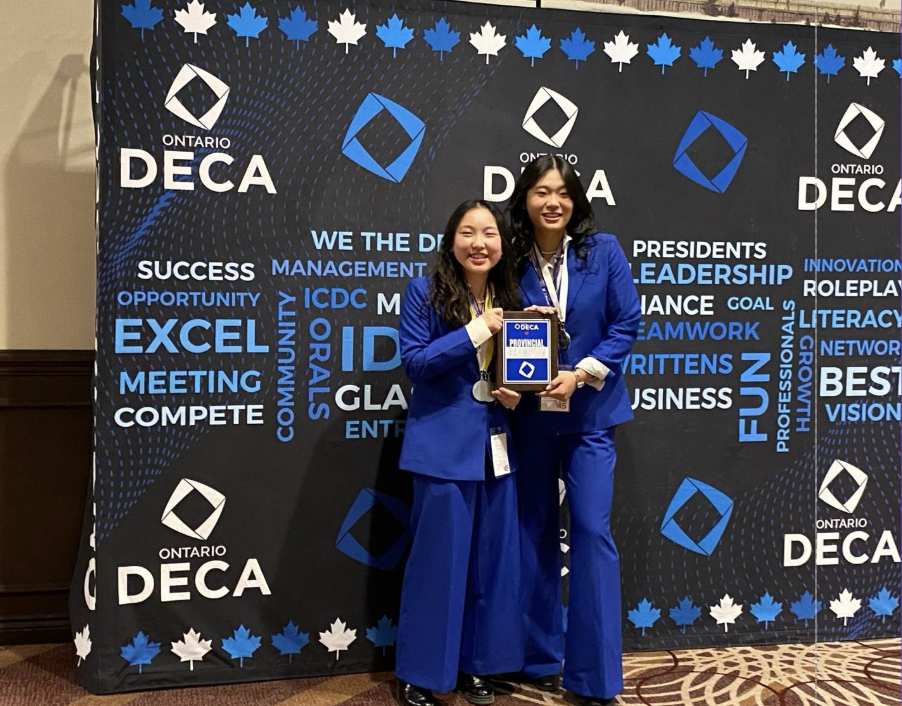A DECA Reflection: 11 Lessons
By Rawnie Sun ’25, Head Editor-in-Chief; Edited by Rebecca Liu ’25, Head Editor-in-Chief

By Rawnie Sun ’25, Head Editor-in-Chief; Edited by Rebecca Liu ’25, Head Editor-in-Chief
November is DECA month! What an organization… Joy, stress, and even a little bit of sadness made up the emotions that sent me careening up and down the rollercoaster that was DECA 2023-2024. The first time I joined DECA in September 2023, it had been purely on a whim. In fact, I had refused to join for the prior two years as I found anything to do with business presentations stifling. Little did I know that DECA would become one of the most rewarding experiences of my time at Ridley. From fumbling my way through my first presentation to earning recognition internationally (albeit only through a seal…), I discovered skills I never thought I had.

This month, DECA celebrates all these moments of laughter, sadness, and reward. November is a time to reflect on how far I’ve grown since that whim in September 2023: I’ve been pushed out of my comfort zone, challenged to answer the questions of judges, and taught the value of adaptability. I’ve learned how to network with Ridley alumni to gain insight into various industries, but perhaps most importantly, embrace failure and take on interdisciplinary approaches. So, in celebration of the 11th month of 2024 being DECA month, I’ll be sharing 11 lessons DECA has taught me.
- Interdisciplinary thinking solves complex problems.
In the first two years of high school, I refused to join DECA. The business world seemed to be made up of stifling jargon and overly formal nonsense. However, my first year in DECA challenged everything I knew about the parameters of a discipline. I learned how to tackle relevant problems such as the job crisis by blending marketing and policy. At the same time, I advocated for refugee rights and efficiency in Canada’s use of resources, both being issues that I’ve held personal passion for. Through DECA, I found the power of interdisciplinary thinking and how it can solve issues through the intersection of various subjects. By blending skills in marketing, law, and policy, I was able to create a multi-faceted campaign that blurred lines that I had previously seen as rigid, showing me that the best solutions may come from interdisciplinary and holistic approaches.
- Networking is the bridge for personal and professional growth.
I first met Andrew Pace ‘13 during Ridley’s annual alumni Tiger Talks where he shared his journey from Ridley to his current position at Talent Beyond Boundaries (TBB), earning 2 law degrees and a Bachelor of Arts degree in political science along the way. I found myself immersed in everything he shared with us, and especially his insights on how Ridley prepares you for the wider world. At the time, I didn’t realize how much his experience would connect and relate to my own projects. Later, when I was working on my DECA project, I realized that TBB would be a great fit. I was then able to use this connection to gain firsthand insights into TBB and also uncover opportunities I hadn’t ever considered before. This experience shows just how powerful networking can be as it taught me that building genuine connections and relationships can lead to collaborations that further professional and personal growth.
To give other students a similar opportunity, I will also be working to connect Ridley Business Club members with alumni in business and commerce! I can’t wait to see how this will push the entire club to grow and excel.
- The pursuit of excellence is a never-ending journey, not a destination.
DECA has three stages of competition, or three chances to pursue excellence: regionals, provincials, and internationals. But in DECA, the true pursuit of excellence extends beyond these three competition levels. Regionals marked the start of my DECA journey, provincials furthered my knowledge, and internationals were the culmination of effort, dedication, and teamwork. While each stage of this three-tiered journey was incredibly rewarding, the real pursuit of excellence and growth showed up in each late-night study session, each practice exam taken during MSIP, and each moment of doubt that came with every setback. These experiences reminded me that excellence isn’t stagnant; excellence is a continuous but sustainable pursuit made up of improvement, reflection, and adaptation. Excellence is about making incremental improvements (if you’re further interested in this idea, read Atomic Habits by James Clear! It’s an incredibly insightful and engaging book on habits) to grow professionally and personally.
- You can turn theory into practice via critical thinking.
There are so many different ways to approach marketing. There are so many ways to tackle every event in DECA. There’s an incredible variety of ways to simply do DECA, but all of these approaches are united by one common thread: critical thinking. Although we may pore over marketing textbooks and cases on human resources, DECA is much more than just memorizing concepts. Success relies on the application of ideas through critical thinking and adaptations to make well-informed and effective solutions to real-world challenges.
- Attention to detail is what sets you apart
The first time I met with past ICDC champion Kechun (Tony) Wu ‘23 in preparation for ICDC 2024, he scanned through my written report. Almost immediately, he pointed out how the paper contained two different body text fonts. He then explained that this wasn’t as simple as a formatting error: success lies in the details that people often overlook but can make a significant difference in the final result. This moment served as a life lesson — excellence requires more than just big ideas. Excellence is the care and attention you put into every aspect of your work.
- Confidence is not created by perfection. It’s by preparation!
In DECA, success comes from taking the time to study, practice, and prepare. Last year was my first year doing DECA, and I felt like a fish out of water as I stumbled through marketing jargon. My interests have always been focused on policy and ethics, so DECA was an entirely new realm for me. However, I found that no matter how nervous I felt and how much I envied the confidence of Loukas Massis ‘24 and my partner Rebecca Liu ‘25, dedication and preparation always ensured that I came to Room 25 confident and ready to present. By the time Provincials came around, I realized that confidence isn’t just being sure in your actions and words: it is about being ready to learn and trusting the work you have done.
- Failure is simply a stepping stone to success
Failure has made up a bit too much of my journey in DECA, much to my chagrin. I remember the disappointment I felt at each stage of the competition. At Regionals, DECA lost my exam score and gave me a zero. At Provincials, Rebecca and I missed our exam by almost 40 minutes due to miscommunication, leaving us only thirty minutes to write our marketing exam. At Internationals, we were placed only in the top 25, failing to be recognized on stage. Each of these obstacles made me question whether DECA was the place for me, but as I learnt to take these setbacks with stride, I realized that DECA isn’t just about winning. It’s about growth, learning to adapt, and the good memories I made along the way. Whether it’s being reduced to tears over not placing top 20 at ICDC in front of Ms. Pak (at KBBQ, nonetheless) or staying up until 3 AM laughing and prepping with Nantume Masturah ‘25 during Provincials, my journey of growth in DECA is one of friendship, laughter, and resilience. Each setback in DECA taught me that success isn’t just measurable outcomes, but also what I take forth as lessons academically and as a person.
- Truly listening is what effective communication is about, not speaking.
Active listening seems to appear in almost every DECA exam, whether it’s marketing or business ethics. In the Ridley Business Club (RBC), we spend hours listening to others’ presentations and giving subsequent feedback. Through this experience, I’ve learnt that truly listening to others is the way to understand and respond meaningfully. Outside of Thursday meetings, I’ve found this skill essential in a multitude of ways, like when reaching out to a company to see what issue they may be struggling. Furthermore, it has taught me how to engage more thoughtfully, a skill that most likely saved my grade during the dreaded HL English Harkness discussions.
- Collaboration is not just about sharing the load, but about creating something better together.
My biggest advice to new DECA competitors is to throw everything you know about collaboration out the window. From dividing up presentations via the RAT method to brainstorming ideas via the Six Thinking Hats method, collaboration in DECA can take on many forms. In my DECA experience, collaboration has no strict structure. In its true form, collaboration is about learning to adapt, working together to create a cohesive result, and pushing each other to be more open-minded and learn from one another. This lesson has served me well in group projects, the RBC leadership team and DECA itself, and my role as a school prefect. As such, I encourage everyone in and outside the RBC to approach collaboration through the central goal of creating something better together.
- Ethics and integrity are the foundation of leadership and teamwork.
I’ve long held this belief, and my time in DECA has only reinforced it. In DECA, we often deal with scenarios where we are forced to act quickly under pressure. Whether it’s answering questions from judges on the fly or making split-second decisions as part of the RBC leadership team, integrity is crucial in all aspects when acting as a team leader. Upholding integrity means staying true to my values, even though it feels easy to take shortcuts, like having artificial intelligence write parts of a written submission. Through DECA, I’ve reinforced my beliefs that taking the ethical route, even though it’s often more time-consuming, leads to long-term success as a teammate and member.
- Resilience is about reflection.
This lesson, like lesson 7, is about failure. Between failing and learning how to use my past mistakes as ways to improve, I struggled with moving forward. For a while, after each hiccup, I would end up in a seemingly endless cycle of anger and sadness. Each time I found myself in this cycle, I had to take the time to sit down and reflect. Not only did I find myself smiling at happy memories and grateful for the skills I’ve learnt (such as how to win battles against Canva lines), but I also came to understand that resilience isn’t about powering through, it is about finding strength in reflection to look ahead to the future.



